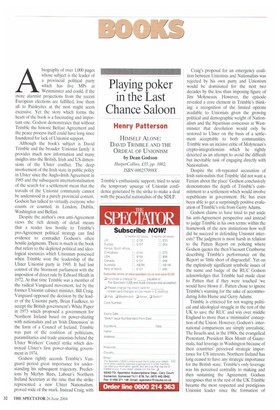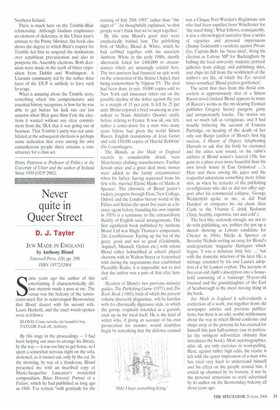Playing poker in the Last Chance Saloon
Henry Patterson
HIMSELF ALONE: DAVID TRIMBLE AND THE ORDEAL OF UNIONISM by Dean Godson HarperCollins, £35, pp. 1002, ISBN 000257098X Abiography of over 1,000 pages whose subject is the leader of a provincial political party which has five MPs at Westminster and could, if the more alarmist projections from the recent European elections are fulfilled, lose them all to Paisleyites at the next might seem excessive. Yet the story which forms the heart of the book is a fascinating and important one. Godson demonstrates that without Trimble the historic Belfast Agreement and the peace process itself could have long since foundered for lack of Unionist support.
Although the book's subject is David Trimble and the broader 'Unionist family' it provides much new information and many insights into the British, Irish and US dimensions of the Ulster conflict. The deep involvement of the Irish state in public policy in Ulster since the Anglo-Irish Agreement in 1985 and the subsequent internationalisation of the search for a settlement mean that the travails of the Unionist community cannot be understood in a purely provincial context. Godson has talked to virtually everyone who counts or counted, in London, Dublin, Washington and Belfast.
Despite the author's own anti-Agreement views the rich density of detail means that a reader less hostile to Trimble's pro-Agreement political strategy can find evidence to contradict Godson's often hostile judgments. There is much in the book that refers to the depleted political and ideological resources which Unionism possessed when Trimble won the leadership of the Ulster Unionist party in 1995. It had lost control of the Stormont parliament with the imposition of direct rule by Edward Heath in 1972. At that time Trimble was a member of the radical Vanguard movement, led by the former Unionist cabinet minister, Bill Craig. Vanguard opposed the decision by the leader of the Unionist party, Brian Faulkner, to accept the British government's White Paper in 1973 which proposed a government for Northern Ireland based on power-sharing with nationalists and an 'Irish Dimension' in the form of a Council of Ireland. Trimble was part of the coalition of politicians, paramilitaries and trade unionists behind the Ulster Workers' Council strike which destroyed Ulster's first power-sharing government in 1974.
Godson rightly accords Trimble's Vanguard period great importance for understanding his subsequent trajectory. Predictions by Merlyn Rees, Labour's Northern Ireland Secretary at the time that the strike represented a new Ulster Nationalism, proved wide of the mark. Instead Craig, with Trimble's enthusiastic support, tried to seize the temporary upsurge of Unionist confidence generated by the strike to make a deal with the peaceful nationalists of the SDLP. Craig's proposal for an emergency coalition between Unionists and Nationalists was rejected by his own party and Unionism would be dominated for the next two decades by the less than imposing figure of Jim Molyneaux. However, the episode revealed a core element in Trimble's thinking: a recognition of the limited options available to Unionists given the growing political and demographic weight of Nationalism and the bipartisan consensus at Westminster that devolution would only be restored to Ulster on the basis of a settlement acceptable to both communities. Trimble was an incisive critic of Molyneaux's crypto-integrationism which he rightly detected as an attempt to avoid the difficult but inevitable task of engaging directly with Nationalism.
Despite the oft-repeated accusation of Irish nationalists that Trimble 'did not want a Fenian about the place' Godson conclusively demonstrates the depth of Trimble's commitment to a settlement which would involve republicans in government. He has even been able to get a surprisingly positive evaluation of Trimble's role from Gerry Adams.
Godson claims to have tried to put aside his anti-Agreement perspective and instead to judge Trimble in his own terms: within the framework of the new institutions how well did he succeed in defending Unionist interests? The judgment is most harsh in relation to the Patten Report on policing where Godson quotes the then Viscount Cranborne describing Trimble's performance on the Report as 'little short of disgraceful'. Yet on the explosively significant symbolic issues of the name and badge of the RUC Godson acknowledges that Trimble had made clear to Patten that if they were touched `we would have blown it'. Patten chose to ignore Trimble's warning for the sake of accommodating John Hume and Gerry Adams.
Trimble is criticised for not waging political and ideological struggle in the rest of the UK to save the RUC and win over middle England to more than a 'minimalist' conception of the Union. However, Godson's international comparisons are simply unrealistic. The Israelis and, in the 1980s, the evangelical Protestant, President Rios Montt of Guatemala, had leverage in Washington because of their countries' perceived strategic importance for US interests. Northern Ireland has long ceased to have any strategic importance for the British state. Trimble's only leverage was his perceived centrality to making and then sustaining the Agreement. Godson recognises that in the rest of the UK Trimble became the most respected and prestigious Unionist leader since the formation of Northern Ireland.
There is much here on the Trimble-Blair relationship. Although Godson emphasises an element of deference in the Ulster man's attitude to the Prime Minister, the book also shows the degree to which Biair's respect for Trimble led him to suspend the institutions over republican prevarication and also to postpone the Assembly elections. Both decisions were made in the teeth of bitter opposition from Dublin and Washington. A Unionist community led by the rather dour faces of the DUP is unlikely to have such leverage.
What is amazing about the Trimble story, something which this comprehensive and essential history recognises, is how far he was able to get before his luck ran out last autumn when Blair gave Sinn Fein the elections it wanted without any clear commitment from the IRA that it was going out of business. That Trimble's party was not annihilated at the subsequent elections is perhaps some indication that even among his own cantankerous people there remains a constituency for a class act.
Henry Patterson is Professor of Politics at the University of Ulster and the author of Ireland Since 1939 (OUP 2002).



































































 Previous page
Previous page